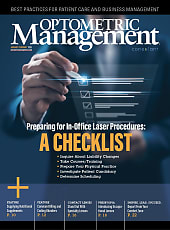
Financial management is the backbone of a thriving eyecare practice, yet it remains one of the most complex areas for many practitioners. At a course during Vision Expo West, “Financial Management for the Eyecare Team,” Phernell Walker, MBA, ABOM, NCLEC, LDO, led attendees through the principles and strategies that support smarter financial decision-making and improved operational efficiency.
Participants explored key performance indicators, the differences between lagging and leading indicators, industry benchmarks, and the anatomy of an income statement.
EB connected with Walker for more of his perspective on financial literacy and how important it is for ECPs to get on board.
Eyecare Business: Why do you believe this topic is important for eyecare providers today?
Phernell Walker, MBA, ABOM, NCLEC, LDO: In today’s competitive health care landscape, clinical excellence alone isn’t enough. Financial management is the backbone of sustainable growth, strategic decision-making, and long-term impact. Modern eyecare practices must be able to navigate reimbursement shifts, invest in new technology, or know when to expand their team. Understanding the financial levers behind your practice empowers you to lead with confidence and clarity.
EB: How can financial literacy help eye care providers measure the health of their practices?
Walker: Financial literacy will show you how to interpret vital signs of your business. Just as we interpret OCT scans or visual fields, we must learn to interpret profit margins, cash flow, and cost-per-patient metrics. These indicators reveal whether your practice is thriving, surviving, or silently struggling.
EB: What would you say to an ECP who believes financial management takes time away from patient care?
Walker: Financial management protects your time with patients. When your practice runs efficiently, when your billing systems are optimized, and when your team understands the economics of care, you gain time, not lose it. Financial clarity reduces stress, streamlines operations, and allows you to focus on what you do best: caring for people. Think of it not as a distraction, but as a strategic investment in your clinical freedom.



